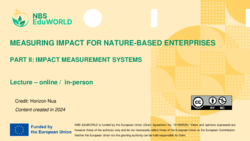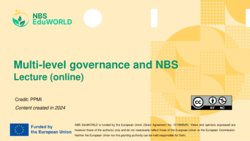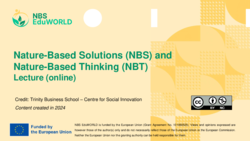
Learning Units
The NBS EduWORLD Learning Units page offers a comprehensive and flexible suite of resources designed to integrate Nature-Based Solutions (NBS) into higher education and professional training. With 50 curated Learning Units, this platform supports educators, students, and practitioners at all levels—undergraduate (UG), postgraduate (PG), doctoral (PhD), vocational, and entrepreneurial.
Covering a broad spectrum of themes and contexts, the Learning Units are structured around key educational streams:
- Common Core Units introduce foundational NBS concepts, such as ecosystem services, biodiversity, and the SDGs.
- 3rd Level Units target university-level learners, with a focus on implementation, policy, social inclusion, and future urban development.
- Entrepreneurial Units support learners exploring nature-based enterprises, business models, green finance, and sector-specific NBS opportunities.
- Vocational Units are tailored for practical skills development, project management, policy engagement, and multi-level governance.
- Case Studies and Workshops offer real-world applications and participatory methods from NBS EduWORLD demonstrator sites across Europe.
Each unit is aligned with European Qualification Framework (EQF) levels, ranging from Level 6 to Level 8, ensuring academic relevance and adaptability.
These Learning Units are editable and adaptable, supporting custom integration into curricula, practice-oriented, blending theory with applied learning, and geographically diverse, reflecting urban, rural, and coastal NBS contexts.
Download the full list of Learning Units
Whether you're a lecturer seeking ready-to-use teaching materials, a student exploring sustainability, or a professional upskilling in green innovation, the NBS EduWORLD Learning Units offer a unique, user-friendly gateway into nature-based thinking and action.
Search results ( 21 - 25 of 41 )
Measuring Impact for Nature-based Enterprise - Part I
Measuring impact is important for all businesses in order to secure customers, financing and investment and to measure progress towards the companies mission and objectives. Nature-based enterprises identify measuring impact as a key priority but also a significant challenge. In this lesson, we explore the terminology around measuring impact, potential impact indicators, strategies and tools to measure impact. Participants will reflect and apply the learning to develop an impact measurement strategy for their own business.
Find here the editable version and the teaching note.
Educational Level: Professional
Language: English
Organisation: Horizon Nua

Measuring Impact for Nature-based Enterprise - Part II
In recent years, company requirements to report on nature have changed significantly. In this lesson we provide an overview of the landscape for reporting on nature and biodiversity, review the relevance of CSRD requirements for nature-based enterprise and explore relevant guidance support and tools available including TNFD LEAP frameworks and the ACT-D approach.
Find here the editable version and the teaching note.
Educational Level: Professional
Language: English
Organisation: Horizon Nua

Multi-level governance and NBS
The learning units first introduces concepts and theories. Thereby, the lecture describes how collaborative MLG can be done in the best way for NBS projects, reflecting on challenges and opportunities, and enabling MLG settings. Lastly, it concludes summarising the main take-aways.
Find here the editable version and the teaching note.
Educational Level: Professional
Language: English
Organisation: PPMI

Nature-Based Solutions and Nature-Based Thinking
As urban communities face immense environmental challenges, NBS in isolation is not generating traction on its own. Nature-Based Thinking (NBT) is enabling a change in mindset for key stakeholders, shifting from a solutionist approach to a systemic one involving multiple interventions and engagement by partners and NBS. This Learning Unit introduces the concept of NBT, how it involves communities, institutions/organisations and nature/ecological processes to reconceptualise human-nature-organisational relationships. It challenges learners to reflect on how communities can relate in new ways to nature, new modes of governing and taking long-term, sustainable management of NBS.
Find here the editable version and the teaching note.
Educational Level: Higher Education
Language: English
Organisation: TCD

NBS community project management
This Learning Unit introduces the essential action areas for effectively managing NBS community projects: how to develop project intervention logic, engage stakeholders, ensure project sustainability, and measure impact. Interactive activities allow learners to practive the application of these actions on hypothetical scenarios of NBS projects.
Find here the editable version and the teaching note.
Educational Level: Professional
Language: English
Organisation: PPMI


Funded by the European Union. Views and opinions expressed are however those of the author(s) only and do not necessarily reflect those of the European Union or the European Commission. Neither the European Union nor the granting authority can be held responsible for them.